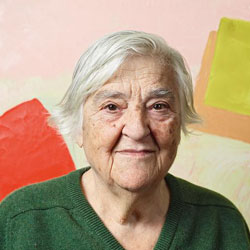I
I am not going to sing.
A temple existed for real,
its stairs are solid
the gods, unwilling to
let go of it,
danced,
then decided to die …
leaving behind
them,
although barbaric,
a sun that we loved.
In the sealed obscurity of the brain
plants grow,
and fish swim,
while we think we’re seeing
landscapes, and looking
at the sea.
we will not know if life is reversible
but written in the pain
a joy that hurts
even more,
as in the heart’s desertion
memory’s fingerprint.
Notes on the Poem
Just as we did last week, let's continue celebrating our freshly announced 2020 Griffin Poetry Prize winners by savouring another selection from Time, Sarah Rigg's translation of the poetry written in French by Etel Adnan. This is an excerpt from the section of the collection entitled "Baalbeck". What an odd, yet oddly compelling dynamic draws us into this poem. "I am not going to sing" is a refusal tinged with weariness, perhaps stubbornness, that bewilders. It's as if a celebration was in the offing, then abruptly cancelled. Astute reviewer Patrick James Dunagan fastens on that abrupt declaration, opening a poem entitled with the name of a city from the country of Adnan's childhood, Lebanon. In his review, Dunagan points out:"At the opening line we are greeted with a first person speaker announcing “I am not going to sing” yet who at the close of the second section [not shown in this Poem of the Week selection] confesses “vibrations of Orpheus, | he, mirror of my soul.” A singer who won’t sing is nonetheless filled by song."Similarly perplexing and contradictory, "the gods ... / danced, / then decided to die ..." What does this juxtaposition of energy and enervation signify? Even the lower case letters at the start of new sentences have an undercurrent of weariness. It's as if the narrator doesn't even have enough vigour to herald a new thought or observation with a capital letter. The "sealed obscurity of the brain" suggests that the engine for those new thoughts or observations is blocked and deprived of oxygen, anyhow - although, paradoxically, "plants grown / and fish swim" in its confines. The 2020 Griffin Poetry Prize judges offer this insight:"What is astonishing here is how she manages to give weariness its own relentless energy. We are pulled quickly through this collection – each poem, only a breath, a small measure of the time that Adnan is counting."With the "time that Adnan is counting", "we will not know if life is reversible" ... is that wry comfort or something else? It fascinates endlessly.
